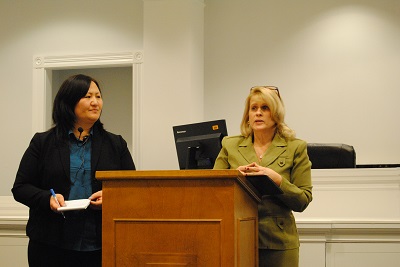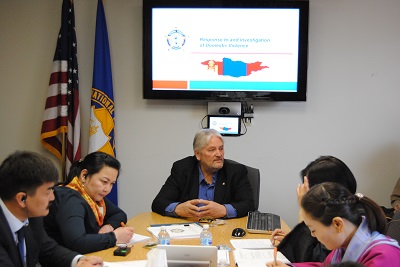Home to around 2,600 Mongolian Americans, the city of Arlington, Virginia has one of the largest Mongolian populations in the United States, to the point that Mongolian is the third-most widely spoken language in the local school system.
The city’s large Mongolian community was one of the reasons it was selected as the destination for an exposure visit facilitated by IDLO for a delegation of Mongolian justice professionals looking to learn about different approaches from U.S. counterparts. The mixed group of ten Mongolian police officers, prosecutors, judges and academics – champions of justice working together to combat domestic violence – spent a week in Washington DC and Virginia.
Domestic violence in Mongolia
Domestic violence is a significant problem in Mongolia, and recent reports have estimated that one in three Mongolian families suffer abuse. Legislation was introduced in 2017 making it a criminal offence, and better cooperation between agencies is critical to reducing the incidence of violence by improving prosecution.
IDLO has been working in Mongolia since 2015 to strengthen the response to domestic violence and increase access to justice for survivors. Supported by the U.S. Department of State, IDLO’s current program is focused on building the professional capacity of first responders through targeted training and improved regulation to formalize coordination efforts.
"The exposure visit gave the Mongolian representatives an opportunity to exchange ideas and compare activities with their counterparts in the U.S.,” explained Oyunchimeg Dash, IDLO’s Field Program Manager in Mongolia. “The coordinated approach they observed in U.S. institutions and organizations constitutes good practice and will help them determine future objectives. But Mongolian law enforcement is on the right path; a lot of international best practice is already being implemented in the country.”
Mongolian law enforcement is on the right path; a lot of international best practice is already being implemented in the country.
The perspective from the United States
In the U.S., one in three women has been physically abused by an intimate partner, and domestic violence hotlines across the country receive approximately 20,800 calls on an average day. Good inter-agency coordination and a strong understanding of the importance of care and prevention are critical to an effective response.
In the words of investigator Mike LaRiviere, an expert who provides nationwide training to sheriffs’ offices and police departments in the US: “You can be the best investigator, police officer, prosecutor or judge, but if you don’t understand the dynamics behind closed doors, there is no way you are going to get to the end result – protecting victims.”
If you don’t understand the dynamics behind closed doors, there is no way you are going to get to the end result – protecting victims.
Mr. LaRiviere continued: “Additionally, we approach these investigations as evidence based, seeking and gathering evidence to support survivor and witness statements. This has led to increased conviction rates and offender accountability. Prosecutors are better prepared to move forward on cases with or without the victims’ participation. Things like photographs, witness statements, 911 calls and follow-up interviews with victims enhance the ability to convict perpetrators and keep survivors safe.”

Betsy Draper, who heads up the witness program in the Office of the Commonwealth’s Attorney for Brunswick County, reminded her Mongolian counterparts that “improved coordination among the agencies is crucial to alleviate the stress of the victim.” Her point resonated strongly with the delegation, made up of representatives of all the main Mongolian justice sector agencies. “When you have so many agencies, it is hard enough for the victim to go through the situation, let alone then retell the story many times,” Ms. Draper said.
Learning from good practice on violence prevention
The delegation picked up new ideas from observing concrete examples in action. “In the United States, all emergency calls are received through only one number (911) which then refers them to other organizations for the necessary assistance. In Mongolia we have many numbers for each type of emergency call. This is less effective because it may result in a delayed response,” observed Mongolian police officer Temuujin Enkhtuya.
Judge Odontuul Nyamdorj commented on the delegation’s visit to a family court within the Superior Court of the District of Columbia: “It was interesting. We observed judicial proceedings in which the judge resolved a dispute in ten minutes – that says a lot about the value of preparation. And in another instance, the judge settled a divorce by speaking to the respondent on the phone.”
We observed judicial proceedings in which the judge resolved a dispute in ten minutes – that says a lot about the value of preparation.
This was echoed by U.S. Associate Judge Hiram E. Puig-Lugo: “Once a person charged with domestic violence is detained in the United States, she or he appears in front of the judge no more than three days later. The defense attorney can request two extra days to investigate. If the person is released upon bond, the hearing is held two or three weeks after the release.”
Mr. Puig-Lugo also pointed out the transparency of court proceedings: “Court proceedings are generally open to the public, unless juvenile delinquency or child abuse cases are adjudicated. If the public sees what the judges are doing, the judges will do what they are supposed to do.”
Cooperation with non-governmental organizations and academic institutions

The visit included meetings not only with government-run institutions, such as courts and police departments, but also with academia, civil society organizations (CSOs) and women’s shelters, thus providing a broader picture of inter-agency coordination and community cooperation. Upon being called to a domestic violence scene, U.S. police officers provide victims with information about available support, effectively referring them to CSOs working in the area. The CSOs in turn alert the police if they identify a victim at risk of serious or lethal assault.
Delegates were struck by this close cooperation between law enforcement and CSOs in preventing domestic violence. “They have a system whereby non-profit organizations work with the government and share the workload. This is the right approach, it makes communication and cooperation smoother,” said Delgermunkh Ayur, a Mongolian prosecutor.
Non-profit organizations work with the government and share the workload. This is the right approach, it makes communication and cooperation smoother.
At George Washington University, law students at the Family Justice Litigation Clinic learn to represent clients in domestic violence cases. Every year, the clinic selects 15 students to provide legal services to victims, working under the guidance of licensed lawyers. The team at the litigation clinic also conducts policy research and makes recommendations for improvement, based on the students’ experiences.
Overall, the exchange worked both ways. The U.S. counterparts shared their knowledge about what has proven successful in their country. The Mongolians in turn were able to provide cultural context to explain why Mongolian families and children react in particular – and at times perplexing – ways, thereby enhancing the cultural understanding and sensitivity of U.S. professionals responding to cases of domestic violence in Mongolian American families.

